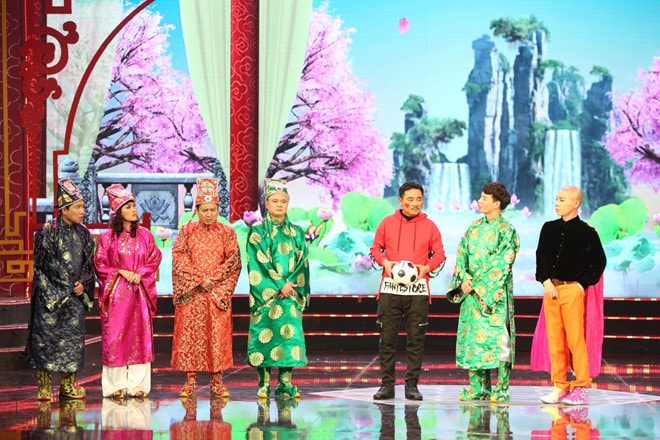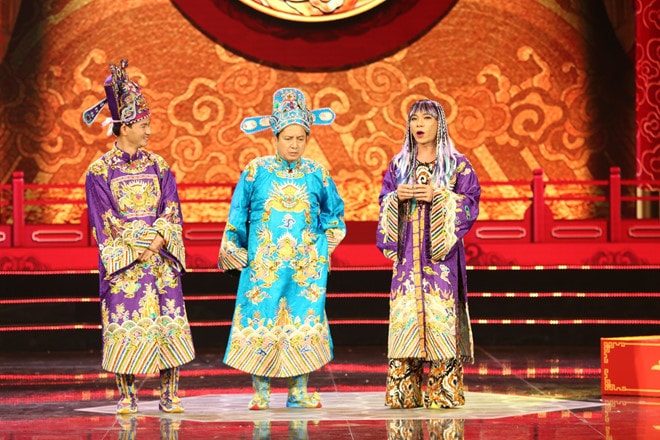3 prominent issues of the education sector named by Tao Quan 2019
The Tao Quan program on New Year's Eve addresses a series of issues in the education sector such as wasting textbooks, cheating on exam scores, and school violence.
This year, artist Chi Trung plays the role of the Education God. Right from the beginning of the meeting, the Education God was criticized by the Traffic God Tu Long for showing off and being innovative because he rode a new electric motorbike.
Next, the Kitchen God in charge of traveling in the lower world also named his colleague the "brightest star" when the education sector had many prominent problems this year.
Textbook waste and exam cheating
Textbook wastage and exam cheating are some of the issues highlighted in a humorous way. In the “Start-up” section set by Nam Tao and Bac Dau, the Education God excellently guessed correctly Bac Dau’s action of carrying textbooks thanks to his “respectful expression”.
|
The report by Education God Chi Trung has received attention after a series of incidents that occurred in the education sector last year. Photo: VTV |
The puzzle of burning textbooks is not difficult for the Tao in charge of the industry. According to him, the whole school year has filled the house with textbooks, so he had to burn them. The Tao of Education affirmed that he did not regret the books burned because the ones who paid for them were... parents.
This story aims to criticize the textbook monopoly mechanism for huge profits. Textbooks are used only once, I cannot let you study again, because there are exercises, you do them right in the book. 70% of textbooks are wasted every year, costing thousands of billions of dong.
Next, with the question of how much one plus one equals, the duo Nam Tao and Bac Dau again "trolled" the scandal of exam cheating that shocked the whole country in the 2018 national high school exam.
Similar to the explanation “one plus one can also equal 9, 10, depending on the will of the person adding the points”, it hinted that the grading process increased the scores of a series of candidates in Ha Giang, Son La, Hoa Binh. One candidate in Ha Giang was even raised by 29.95 points/3 subjects, that is, from failing to being close to valedictorian.
Last year, the exam cheating scandal in Ha Giang shocked the whole country when officials from the Department of Education and Training altered the scores of 330 multiple-choice tests. Meanwhile, the exam cheating in Son La and Hoa Binh was even more sophisticated. Last January, the Ministry of Education and Training announced that it had identified the candidates whose scores were altered in Son La. To date, the number of exam papers with altered scores, as well as the actual scores of the candidates in Hoa Binh, have not been clarified.
Referring to the sad story above, Nam Tao Xuan Bac sarcastically said that candidates "if they can do it, then do it. If they can't, then don't do it because after the exam, they can come back and wait, who knows, they might become valedictorians."
The story of declining pedagogical ethics
In addition to the exam scandal and textbook waste, this year's Tao Quan program also addresses the issue of pedagogical ethics with incidents that have caused public outrage.
The question “How much is 23 x 10 + 1?” evokes the pain of a teacher in Quang Binh who asked students to slap a male student 230 times because he used foul language. The teacher also slapped the student once more as punishment.
|
A series of issues in the education sector in 2018 were mentioned in Tao Quan 2019. Photo: VTV |
231 slaps from teachers and classmates made Ngoc Hoang Quoc Khanh worried about medieval behavior in the educational environment. This is also the concern of public opinion before a series of cases of teachers abusing students, from beating themselves, asking students to beat their friends to forcing students to eat chalk and drink blackboard cleaning water.
Not only teachers, the regulation that student teachers will be expelled if they sell sex 4 times is also being "questioned" by the Education God.
Although there are still many outstanding problems, it cannot be denied that the education sector has difficulties, especially at the input stage when good students turn their backs on the profession and choose "hotter" majors, making it impossible for teachers to recruit good students.
At the same time, the industry also has bright spots and positive stories such as teachers spending their own money to buy clothes and cook for students or excellent students bringing home valuable medals from international competitions.



